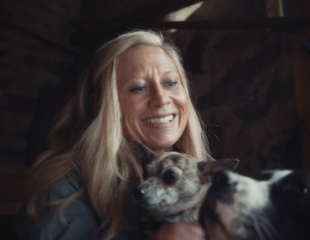"There’s So Much Hope Out There"
4-minute read
"There’s So Much Hope Out There"
4-minute read
Lucinda remembers thinking: It can’t be posttraumatic stress disorder.
The U.S. Coast Guard Veteran knew that things in her life weren’t right. She had lost a sense of purpose, she was just going through the motions, and she was drinking to bury the pain. One day, she was working as a jailer in the sheriff’s department, serving food to inmates; the next day, she was in the jail herself after being arrested for a DUI.
But this diagnosis — PTSD — couldn’t be right.
“I hadn’t been in the jungle. I hadn’t been in the desert,” Lucinda says. “I mean, I knew something was wrong with me, but I adamantly denied that I had PTSD.”
But she had been through the unimaginable, losing her youngest son to a form of sudden infant death syndrome. He was 3 months old and had been with a babysitter when he just stopped breathing. Lucinda had been getting a physical on base when her pager kept reading “911.”
She rode in the front seat of the ambulance that later transferred her son to a children’s hospital. Ultimately, she and her husband had to make the decision to take him off life support.
“I held him and sang to him,” Lucinda says. “For some odd reason, I looked at my watch when I knew he was gone. It was 6:18, and that number always haunts me.”
After his death, Lucinda left the Coast Guard and moved back across the country to Montana with her husband and her elder son. She started working at a sheriff’s department and taking classes.
But she also started drinking. And after she received a DUI, the sheriff’s department encouraged her to seek help. She tried counseling, but it didn’t take at first. She was diagnosed with PTSD, but didn’t necessarily believe it. “I felt like, ‘I’ve been a strong person all my life, that I can overcome this. I can do whatever I need to do and I’ll get through it, and I don’t need help from anybody.’”
But all that changed, years later, when her granddaughter was born.
“That made a world of difference to me,” she says. “I decided I needed to do something, and I needed to do it now and give it 100%. So, I went back to the VA.”
Admittedly, Lucinda was skeptical at first about some of the counselors because they weren’t Veterans themselves. “But these counselors ended up making a huge impact on my life,” she says. So too did group therapy.
“[It’s] great, because if somebody’s thinking a certain way, another person may see another way to problem-solve or a whole different light to it — come up with a positive rather than what might seem so negative,” she says. She also valued the comradery among Veterans: “No matter what’s going on, they will always, always have your back.”
Lucinda used one-on-one sessions to explore certain things more in-depth, or to talk about things that she wasn’t quite ready to bring up in group therapy — like the relationships in her life.
Eventually, she began to understand the PTSD diagnosis as well.
“I never understood why, when EMS or fire engines would go by and be really close to me, I’d almost just get in a fetal position and hide,” she says. “And it started making sense about why those sirens would just make me want to hide and not know what to do with myself.”
During an eight-week inpatient program in South Dakota, Lucinda learned about tools to understand and address her anxiety and to work on her relationships. These days, when an ambulance passes, “I’ve learned to pray for the people they’re going to help, versus getting myself in a tailspin.”
It happens with baby steps. But Lucinda has started to find purpose and passion in her life again. She wants others to know that there is help out there — many different kinds of help — and that they shouldn’t wait to reach out.
“I’m proud that I served this country,” she says. “I’m proud to be able to talk about my journey. … I’m proud that I can come here and say, ‘This is what I’ve struggled with, and it took me low, but I am doing well today and there’s so much hope out there.’ And I’m grateful that I’m still alive.”
Lucinda has found ways to boost her sense of well-being. In 2007, she ran the Portland Marathon to raise awareness and money for homeless Veterans. Running remains a way for her to clear her head, to get ready for the day ahead.
In addition to her young granddaughter, her two dogs bring joy as well. She says they make “my heart smile.” Six weeks before she sat down and shared her story, she adopted her second dog, Pistol Pete, from a rescue group. She’s working with him now to be her running partner. He’s getting there — ready to join her out on her runs, on the next steps of her journey.
“I go to the top of the mountain sometimes, and I just look around at all the beautiful scenery here,” she says. “And I just know that there is something bigger out there.”

